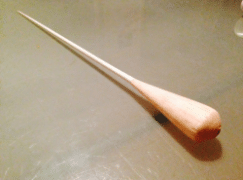Mozart died today
Orchestras230 years ago.
He was writing this.

Dear Alma, I am a male conductor in…

An angry op-ed in the San Francisco Standard…

The Berlin Philharmonic chief conductor made some sphinx-like…

Breaking 180 years of male exclusivity, the Vienna…

Session expired
Please log in again. The login page will open in a new tab. After logging in you can close it and return to this page.
Only bodies seem to die, spirits don’t. Even bodies don’t really die, because it was the spirit that gave them life. Life doesn’t really die….
have bought a box of “Mozart” chocolates recently. Will eat them for eternal life and his music … No death for us at all 😉
A world without Mozart would be an IMMENSELY diminished world. Perhaps, only Shakespeare created a comparably rich and wide-ranging artistic output.
If one looks at the handwriting, the changes in the script, which indicate lead poisoning as a result of syphilis therapy, are clearly visible in the “Freimaurerkantate”. In contrast, the typeface in the Requiem is still largely intact. Mozart’s wife Constanze had considerable interest in making the best possible use of the Requiem; however, an impressive legend would be just the thing. Perhaps because the public is also all too eager to believe the impressive legend, it is generally assumed that the Requiem is Mozart’s last work. However, there is much to suggest that the last notes were for the “Freimaurerkantate” (see also: L. Köppen: “Mozarts Tod”). We will never know for sure.
“lead poisoning as a result of syphilis therapy”
Mercury, more likely.
Dear Allen, thanks for correcting me! I am not a native speaker and mixed up both words. You are completely correct. Mercury was a common, long-standing treatment for syphilis.
I tried once to write an article analyzing the cause of death of Mozart but I gave up after I did the research since one is only left with speculation. I reviewed all the letters of those who visited him during the last few weeks of his life. Although I am not a “Medical historian” rather a medical scientist, I think it is very hard if not impossible to verify the cause. There is no way that a handwriting could be described as due to Mercury (or lead) poisoning. The only evidence that I could find is that his friends said he was swollen up feet and hand but was lying flat in bed. There are three causes of being highly swollen up, liver disease heart disease or kidney disease. In liver disease (cirrhosis) most of the swelling would be in the abdomen not elsewhere. In heart disease. the patient cannot lie flat in bed, they can breathe much better sitting up. So my conclusion was kidney disease. Mercury can cause kidney disease
And, he had finished Die Zauberfloete that year.
I was in his home town on the 191st anniversary of his death.
The cathedral where he was a servant hosted an incredible concert that night, a couple symphonies. No requiem, though, which I was able to attend a performance of later, that was a moving experience, too.
Indeed he was writing the Requiem for himself, after a number of years in rising puzzlement about his career gradually fizzling-out instead of unfolding in the glory of his music – he knew that it was something entirely beyond the music of his time. He could not know what would happen later-on with his oeuvre, but for him at the time it must have been an incomprehensible reality, impossible to deal with – leading to an inhuman inner loneliness. After a whole life – from childhood onwards – as a general, very promising upbeat and upwards perspective, such downwards spiralling must have been unbearable and leading to utter desolation and depression, which – as we know – can make the body vulnerable. This inner state is best expressed in his late string quartet:
https://www.youtube.com/watch?v=-RWsgnZZrZQ
What utter nonsense! The Requiem was a commission. His career was not in a downward spiral. The string quartet K 516 was composed in 1787, when he was only 31, hardly a late work. His marriage to Constanze seems to have been a happy one, and he had many friends. Of course there may be other composers whose careers spiked early, who had no success in later life, and who became bitter, envious and generally misanthropic as a result …
Nor, as another comment asserts, is there any evidence that Mozart was treated for syphilis. I believe the current view is that he died from complications of a streptococcal infection, of which there was an epidemic in Vienna at that time, and which may also explain an unusually high number of deaths of younger man.
M’s last years were far from happy and it has been documented how his life went downwards. See Hildesheimer’s groundbreaking biography.
Correction – the youtube link is to the String Quintet K516.
Yes, I forgot that one viola. It’s Freudian I fear.
You knew him, did you?
Read Hildesheimer’s biography:
https://books.google.co.ug/books?id=E4crAQAAIAAJ&source=gbs_navlinks_s
As a corrective to the somewhat quirky and self-indulgent Hildesheimer, take Volkmar Braunbehrens, Mozart in Vienna 1781-1791, for a much more reality-based account of his last decade. And re-read the Mozart correspondence, without preconceptions, if possible. And balance his G minor moments with his C major ones!
We have a drawer full here with C major ones & it’s always locked.
Sally
To specify: it’s not a str quartet but a str quintet, and I particularly meant the 1st & 3rd mvt, and the introduction to the 4th.
The third movement seems to me magically serene and hopeful (especially if played adagio ma non troppo, as by the Emerson with Kim Kardashian). The beginning of the fourth is a wonderful dramatic gothic horror introduction (I love that chromatic descending bass line) to the final G major dance – I don’t hear desolation or depression. But thank you for the stimulus to listen carefully again to this masterpiece!
Yes, it’s wonderful and one never gets tired of it.
One of the greatest minds the human race ever produced.
The joyous order of the universe made audible through a human being.
What if he had lived as long as his father Leopold did? So imagine that he died in 1824, just a few years before Beethoven and Schubert. Would we now view all the masterpieces we so love as immature works, or as mere “early and middle period?” Could he have done more, and been greater? Or would time have passed him by as it did Spontini?
His great competition would have been Beethoven. Given that he had the knack of absorbing all kinds of influences if they stimulated him (like JS Bach’s ), and that some of the typical heroic elements of Beethoven were already present in his own style, it can be assumed he would have turned lots of Beethoven into a more slender, more chromatic and more complex Mozart style, much to Beethoven’s chagrin. He and Beethoven would have been the stellar composers of their day, with the result that younger composers would be pushed even more into completely other directions, just to save their skin.
What would you rather – live long but be a dull composer, or live hard and fast but blaze a trail that lasts for eternity? I know where my vote sits – definitely the latter.
It’s a matter of condensation & tempo.
There are compsoers who get quite old and blossom later in life: Monteverdi, Haydn, César Franck.
In his later years, Boulez secretly wrote some truly lovely tonal music for string quintet, in the style of Saint-Saëns. He put them into a drawer for posthumous rehabilitation, but one day his housekeeper cleansed the room so drastically that they were thrown away. Then he gave-up.
No, not immature. Not ‘middle period’. They were great and revolutionary works for very real, specific reasons.
As for how he might have done had he lived, let’s consider that he was only 35 and his output in his final years was prodigious. Some of his greatest music came from these years. I think there’s a good chance he could have continued to write ever greater and greater music.
A different question actually comes to mind for me. How would Beethoven, Schubert, and all the other composers of the post 1791 era have influenced Wolfi? Think of just Beethoven and Schubert and what they had done by 1824.
Another question to ponder: How might an ever expanding genius like Mozart have influenced Beethoven, Schubert and their generation?
The greatest musical talent ever.
Thanks to his father and his travelling from baby age onwards, and as a result of the sacrifice of his youth.
I wouldn’t worry about this – his birthday is next month. That’s a greater cause for celebration! Think what we’d be missing if that never happened.
“Mozart died today. Or maybe yesterday. I can’t be sure. The telegram from the Home says: ‘Mozart Passed Away. Funeral Tomorrow. Profound Sympathy.’ Which leaves the matter in doubt; it might have been yesterday.”